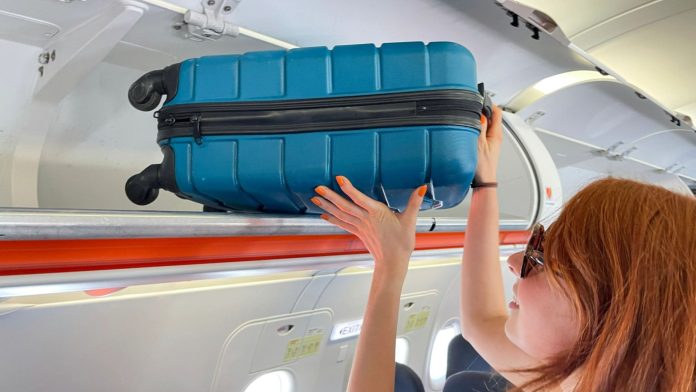The Shocking Truth: What Flight Attendants Really Hate About Boarding
Flight attendants play a crucial role in making air travel enjoyable, but there’s one part of their job they absolutely dread—boarding. A flight attendant from Alaska Airlines, Justine, has spilled the tea on the most frustrating aspects of this process. Let’s dive into the chaotic nature of boarding that can put even the most seasoned crew members to the test.
The Chaos of Boarding: A Flight Attendant’s Perspective
Have you ever thought about why boarding is such a stressful time for flight attendants? Justine describes it as the "most chaotic and hardest time in our day." During this hectic period, she has to juggle countless responsibilities while trying to keep the peace among anxious passengers.
One of the primary challenges is that boarding is incredibly time-consuming. Although passengers might see it as just getting onto the airplane, for crew members, it’s a whirlwind of tasks that often gets overlooked. What’s worse? These hard-working individuals aren’t even compensated for the time spent boarding.
Justine explained, “The most frustrating aspect of it is that I’m there representing the airline. I’m in my uniform, I’m doing my job, and I could do something wrong and be disciplined, but I’m not getting paid." How unfair is that?
Emotional Strain: The Hidden Cost of Boarding
The emotional toll of boarding shouldn’t be underestimated. Justine mentioned that it’s one of the more emotionally draining aspects of her work. Flight attendants go above and beyond to help ease the nerves of passengers, particularly those who are flying for the first time or may have a fear of flying. This emotional work takes its toll, especially when combined with the physical demands of navigating crowded aisles and managing overhead luggage.
As flight attendants assess whether they need to check bags or watch for passengers with too many carry-ons, they must also be cautious about lifting bags themselves. Justine pointed out, “We’re not supposed to lift bags because if I’m injured during boarding, I’m not covered.” Imagine trying to help everyone while also being limited in what you can physically do!
The Downside of the TFP System: Why Flight Attendants Feel Shortchanged
Many airlines employ a payment system known as TFP (Trip Flight Pay), which calculates pay based on the time from aircraft doors closing to about 15 minutes after doors open for deplaning. This means that time spent boarding—critical to the overall safety and efficiency of the flight—basically goes unpaid. This absurdity leads to feelings of being slighted and underappreciated among cabin crew.
Unfortunately, even a newly introduced boarding fee—attempting to compensate flight attendants for their unpaid labor—has not proven beneficial across the board. Currently, only Delta and Southwest Airlines have implemented this fee, and the compensation offered is paltry, with Delta paying just 50 percent and Southwest offering only 25 percent of what flight attendants deserve.
Helpful Tips from a Flight Attendant: Smooth Sailing During Boarding
To alleviate some of the stress associated with boarding, Justine has a few simple tips for passengers. Firstly, she advises travelers to plan ahead regarding carry-on luggage. The lighter and more organized you are, the smoother the boarding process will be for everyone involved.
Another piece of advice is to avoid stuffing jackets and smaller items into overhead compartments, as these items will likely get removed during boarding to make space for more important luggage.
Additionally, finding your allocated seat and sticking to it can greatly reduce congestion in the aisles. If everyone cooperates, the boarding process can be completed swiftly and efficiently. Simple gestures, like greeting the flight attendants as you board, can also go a long way in fostering a positive atmosphere.
Spotting the Worst Passengers: Who Makes Boarding Stressful?
Justine candidly revealed that certain passenger types make the boarding experience more challenging. Here are her top three worst passengers:
-
Drunk Passengers: Those who overindulge can become disruptive, complicating the crew’s job. Justine warns, "If there’s an emergency and you’re hammered, you’re going to be no use to anybody, least of all yourself."
-
Vapers: With vaping gaining popularity, Justine reminds us that the fruity smoke can cause panic among other passengers, creating chaos in an already stressful environment.
- Loud Music: Ever sat next to someone blasting their phone’s music for the entire flight? Justine notes that while some enjoy sharing their favorite tunes, it’s vital to remember that not everyone wants to hear it.
Mastering Plane Etiquette for a Better Flight Experience
If you’re traveling soon, keep in mind some essential unwritten plane etiquette rules.
Be mindful of reclining your seat. Always check to see what the person behind you is doing, and if they’re working, it’s best to ask before you lean back. Also, keep your feet within your own area; shared space is already at a premium on planes!
Lastly, keep conversations with strangers to a minimum. Many travelers value their personal space, so if you’re not inclined to chat, simply enjoy your "me time."
All in all, being aware of these subtleties can drastically improve your flight experience and foster a much friendlier atmosphere onboard.
In summary, the next time you board a flight, keep in mind the challenges flight attendants face during this chaotic process. By being considerate and following just a few simple guidelines, you can help make the boarding experience enjoyable for everyone involved! Safe travels!

